OVERVIEW
1. Introduction
In this fast-paced world, many individuals seek natural alternatives for their health and personal care needs. Australian tea tree oil, known for its potent properties, has become a popular choice. This article aims to shed light on the benefits and applications of this remarkable oil.
2. What is Australian Tea Tree Oil?
Australian tea tree oil, scientifically known as Melaleuca alternifolia oil, is derived from the leaves of the tea tree plant native to Australia. It has a long history of traditional use by the indigenous Bundjalung people for its medicinal properties. The oil is extracted through a careful process to preserve its therapeutic compounds.
3. The Extraction Process
The extraction of Australian tea tree oil involves steam distillation. The leaves of the tea tree plant are harvested and subjected to high-pressure steam. This process allows the volatile compounds within the leaves to vaporize. The steam and volatile compounds are then condensed, resulting in the collection of pure tea tree oil.
4. Chemical Composition and Properties
Australian tea tree oil contains several active components that contribute to its beneficial properties. The most notable one is terpinene-4-ol, which exhibits powerful antimicrobial and anti-inflammatory effects. Other constituents, such as cineole, terpinene, and alpha-terpineol, also contribute to the oil’s therapeutic properties.
.
BENEFITS
Health Benefits of Australian Tea Tree Oil
Skin Care:
Australian tea tree oil is renowned for its ability to promote healthy skin. Its natural antiseptic properties make it effective against various skin conditions, including acne, fungal infections, and insect bites. It can soothe inflammation, reduce redness, and assist in the healing process.
Hair Care:
The antimicrobial properties of Australian tea tree oil make it beneficial for maintaining a healthy scalp and hair. It can help alleviate dandruff, itchiness, and dryness, leaving the hair nourished and revitalized. Incorporating tea tree oil into hair care routines can promote overall scalp health.
Oral Health:
Tea tree oil can also contribute to good oral hygiene. Its antibacterial properties help combat oral bacteria that cause bad breath, gum infections, and tooth decay. Adding a few drops of tea tree oil to homemade mouthwash or toothpaste can enhance oral health and provide a refreshing sensation.
Natural Antiseptic: Due to its antimicrobial and antifungal properties, Australian tea tree oil serves as a natural alternative to conventional antiseptics.
INGREDIENTS
The main active ingredient in Australian tea tree oil is terpinene-4-ol. It is responsible for many of the oil’s therapeutic properties. Additionally, tea tree oil contains other beneficial components such as cineole, terpinene, and alpha-terpineol. These compounds work together to provide the oil’s antiseptic, anti-inflammatory, and antimicrobial effects. The unique combination of these ingredients makes Australian tea tree oil a powerful and versatile natural remedy.
GUIDE
Australian tea tree oil can be used in various ways to benefit the skin and hair. Here are a few recipes for incorporating Australian tea tree oil into your skincare and haircare routines:
Tea Tree Oil Face Toner:
Ingredients:
1/2 cup distilled water
1/4 cup witch hazel
10 drops of Australian tea tree oil
Instructions:
Combine all the components within a pristine bottle, ensuring a thorough mixture.
Vigorously shake the bottle to achieve a complete amalgamation of the ingredients.
Following the cleansing of your face, gently apply the toner onto a cotton pad.
Delicately glide the toner over your facial skin, taking care to bypass the sensitive eye region.
Allow it to dry and follow up with your moisturizer.
Tea Tree Oil Acne Spot Treatment:
Ingredients:
2 tablespoons aloe vera gel
3 drops Australian tea tree oil
Instructions:
Combine the aloe vera gel and tea tree oil in a small bowl.
Thoroughly blend the mixture until the oil is uniformly dispersed.
Dab a small amount of the mixture onto a clean fingertip.
Directly administer it to the affected areas of acne or blemishes.
Allow it to remain undisturbed either throughout the night or for a minimum duration of 30 minutes before gently washing it off.
Tea Tree Oil Scalp Treatment:
Ingredients:
2 tablespoons coconut oil
5 drops of Australian tea tree oil
Instructions:
Melt the coconut oil in a microwave or on a stovetop until it becomes liquid.
Allow the oil to cool slightly, then add the tea tree oil.
Mix well to ensure the oils are thoroughly combined.
Section your hair and apply the mixture to your scalp using your fingertips.
Massage gently for a few minutes to promote absorption.
Allow the treatment to sit for a minimum of 30 minutes, or if preferred, leave it on overnight to maximize its effectiveness.
Cleanse your hair in a customary manner, employing a gentle shampoo.
Remember to perform a patch test before using any new product or recipe, especially if you have sensitive skin or allergies.
FAQs – Tea Tree Oil
What is Tea Tree oil?
Tea Tree oil is an essential oil derived from the leaves of the Melaleuca alternifolia tree native to Australia. It has a wide range of benefits and uses, particularly in skincare, haircare, and health routines.
How is Tea Tree oil produced?
Tea Tree oil is produced through a process called steam distillation. The leaves of the Melaleuca alternifolia tree are carefully harvested and then subjected to steam distillation to extract the oil.
What are the advantages for the skin of utilizing Tea Tree oil?
Tea Tree oil is known for its antimicrobial and anti-inflammatory properties, making it effective in combating acne, reducing blemishes, soothing inflammation, and promoting wound healing. It can also alleviate symptoms of skin conditions like eczema and psoriasis.
Can Tea Tree oil be used for haircare?
Yes, Tea Tree oil has beneficial properties for haircare. It can help address issues like dandruff and itchy scalp due to its antifungal properties. Tea Tree oil also stimulates hair growth, reduces scalp inflammation, and adds shine to the hair.
Are there any health benefits associated with Tea Tree oil?
Tea Tree oil possesses antibacterial and antiviral properties, which can be useful in natural remedies for colds, coughs, and respiratory infections. It can also be used as a natural insect repellent and soothe minor cuts, burns, and insect bites.
How should Tea Tree oil be used for skincare?
To use Tea Tree oil for skincare, it is recommended to dilute it with a carrier oil like jojoba or coconut oil before applying it to the skin. By incorporating this practice, you can effectively mitigate the occurrence of skin irritation while ensuring optimal absorption of the product.
Can Tea Tree oil be ingested?
No, Tea Tree oil should not be ingested. It is meant for external use only. If accidentally swallowed, it can cause adverse effects and should be treated as a medical emergency.
Are there any precautions or side effects of using Tea Tree oil?
Although Tea Tree oil is generally well-tolerated by the majority of individuals, it is important to note that certain people may experience skin irritation or allergic responses as a result of its usage. Prior to applying Tea Tree oil to larger areas of the skin, it is crucial to conduct a patch test for safety measures. Additionally, pregnant or breastfeeding women and children should consult a healthcare professional before using Tea Tree oil.
Can Tea Tree oil be used on pets?
Tea Tree oil can be toxic to pets, especially cats. It is best to avoid using Tea Tree oil on pets or consult a veterinarian for safe alternatives.
Remember, it’s always advisable to consult our healthcare professional or aromatherapist before using Tea Tree oil for any specific health concerns or if you have any underlying medical conditions.


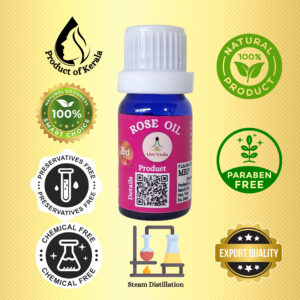 ROSE OIL-10 ML
ROSE OIL-10 ML LEMONGRASS OIL - 10 ML
LEMONGRASS OIL - 10 ML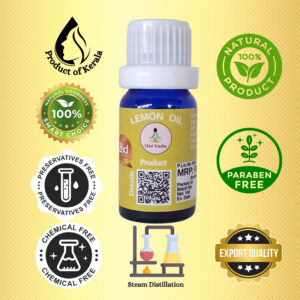 LEMON OIL- 10 ML
LEMON OIL- 10 ML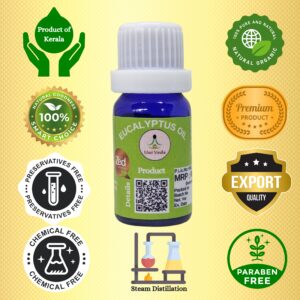 EUCALYPTUS OIL- 10 ML
EUCALYPTUS OIL- 10 ML YLANG YLANG - 10 ML
YLANG YLANG - 10 ML CITRONELLA OIL- 10 ML
CITRONELLA OIL- 10 ML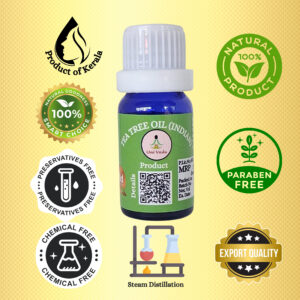 TEA TREE OIL (INDIAN)- 10 ML
TEA TREE OIL (INDIAN)- 10 ML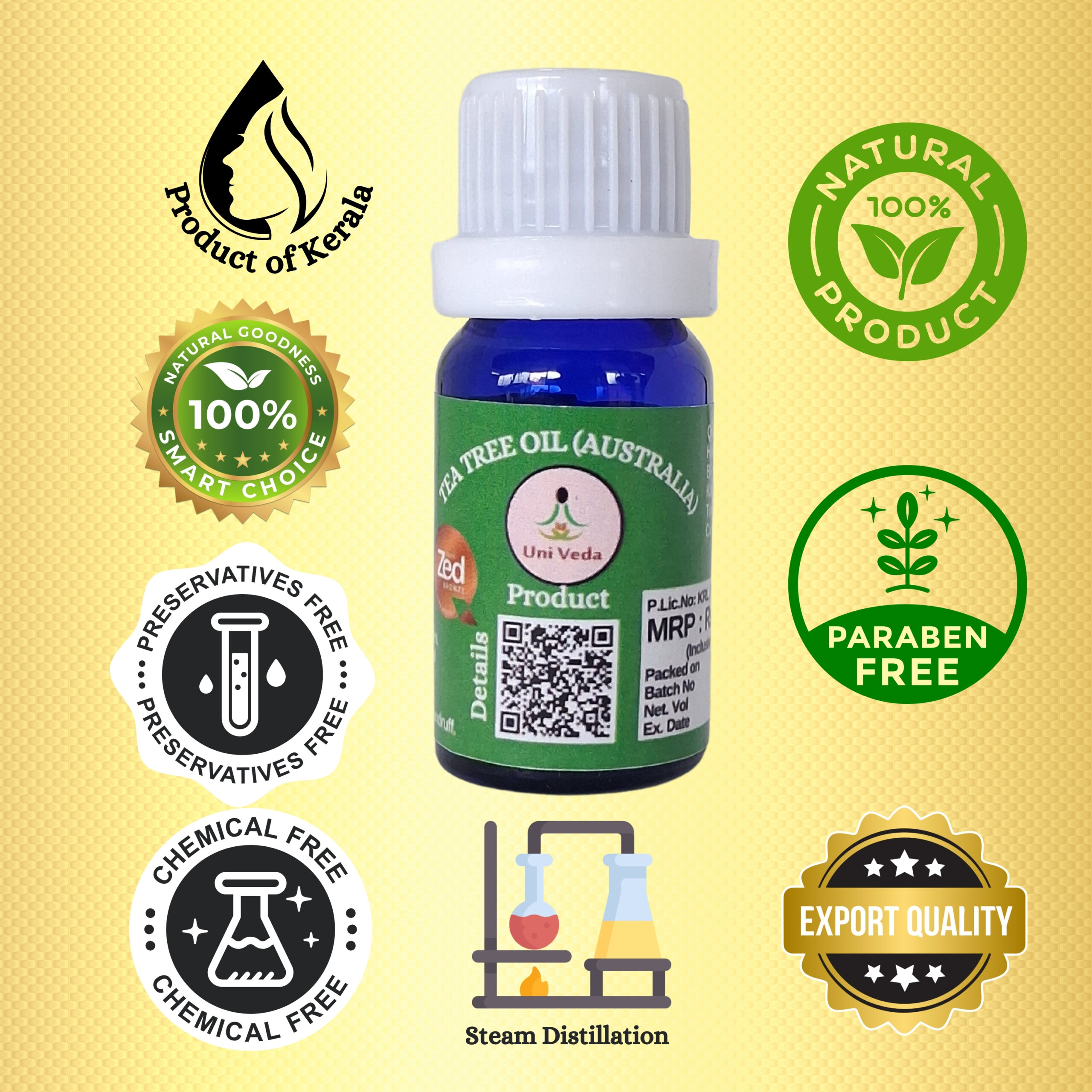
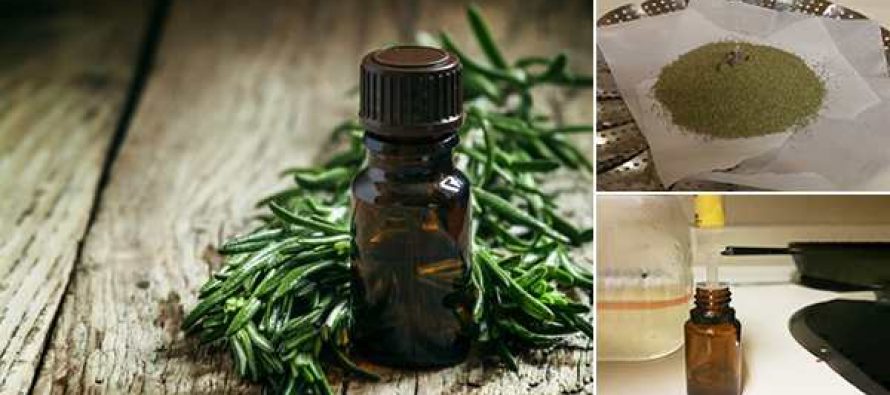
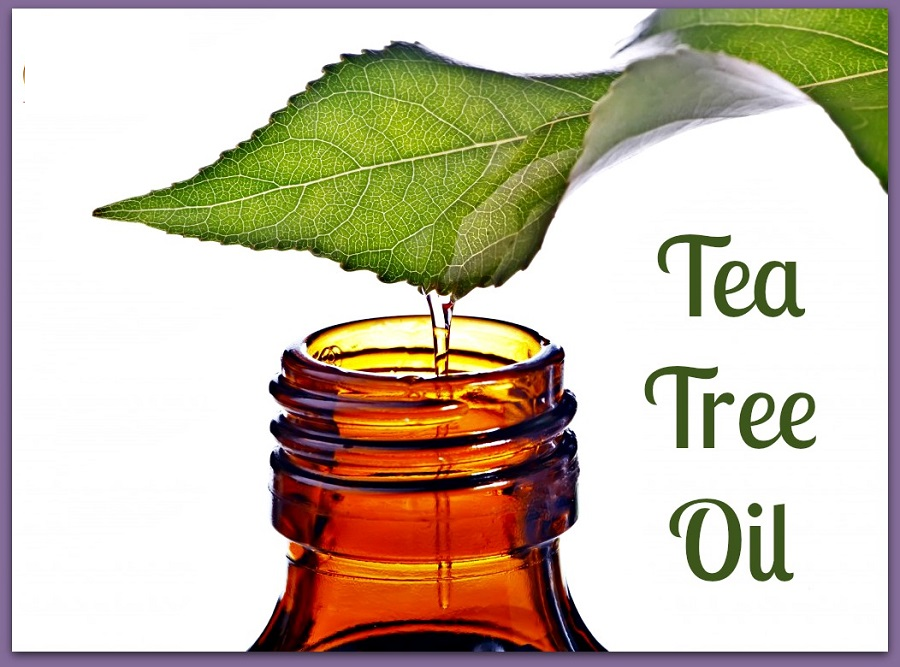
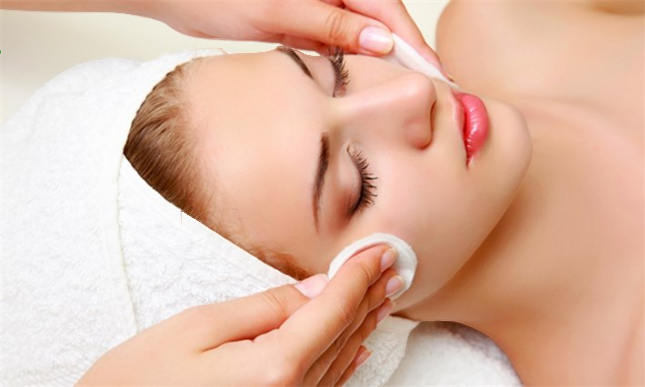



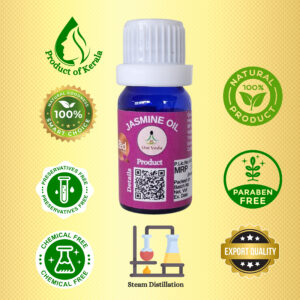
Reviews
There are no reviews yet.